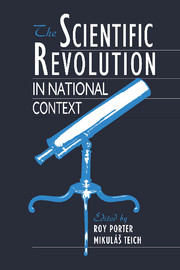Book contents
- Frontmatter
- Contents
- Notes on contributors
- Acknowledgements
- Introduction
- 1 Scientific Revolution, social bricolage, and etiquette
- 2 The Scientific Revolution in France
- 3 The Scientific Revolution in the German Nations
- 4 The new philosophy in the Low Countries
- 5 The Scientific Revolution in Poland
- 6 The Scientific Revolution in Spain and Portugal
- 7 The Scientific Revolution in England
- 8 The Scientific Revolution in Bohemia
- 9 Instituting science in Sweden
- 10 The Scientific Revolution in Scotland
- Index
3 - The Scientific Revolution in the German Nations
Published online by Cambridge University Press: 05 June 2012
- Frontmatter
- Contents
- Notes on contributors
- Acknowledgements
- Introduction
- 1 Scientific Revolution, social bricolage, and etiquette
- 2 The Scientific Revolution in France
- 3 The Scientific Revolution in the German Nations
- 4 The new philosophy in the Low Countries
- 5 The Scientific Revolution in Poland
- 6 The Scientific Revolution in Spain and Portugal
- 7 The Scientific Revolution in England
- 8 The Scientific Revolution in Bohemia
- 9 Instituting science in Sweden
- 10 The Scientific Revolution in Scotland
- Index
Summary
Historia von D. Johann Fausten (Frankfurt-am-Main, 1587) tells the sad story of a Wittenberg alumnus. Faust, an astrologer, a doctor of theology and medicine, who studied night and day, despaired finally of the knowledge in books. He sold his soul to Satan for twenty-four years of real power, in order to fulfil academic male fantasies. But, like a good German, Faust continued working for eight years after the pact. With Mephistopheles he journeyed through the celestial spheres, and from these observations produced the best calendars and prognostications. Through satanic arts, he was able to dominate nature, emblematized by food, peasants and women. He travelled much, and demonstrated his abilities for many audiences, including the imperial court. His fame spread. (In later editions of his Historia, other universities will woo him from Wittenberg.) By magic he feted his colleagues on free food, as if a job search committee were in permanent session. He slept with a new woman every night. But he perished wretchedly, and went to hell.
Faust's Historia is a German testament to a male intellectual crisis of the early modern era: desire for more power and knowledge over heaven and earth than were contained in the traditional philosophy's books. That is the motif for my analysis of the Scientific Revolution, which has this structure: instruments and experimentalism; mathematics and heliocentrism; mechanica mundi et harmonia mundi.
- Type
- Chapter
- Information
- The Scientific Revolution in National Context , pp. 90 - 114Publisher: Cambridge University PressPrint publication year: 1992
- 5
- Cited by



